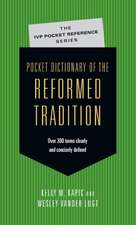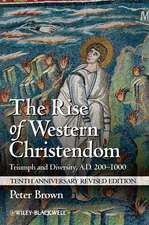On Jordan's Stormy Banks
Autor Randy J. Sparksen Limba Engleză Paperback – 31 aug 2012
Preț: 247.13 lei
Nou
Puncte Express: 371
Preț estimativ în valută:
47.29€ • 49.50$ • 39.36£
47.29€ • 49.50$ • 39.36£
Carte tipărită la comandă
Livrare economică 31 martie-14 aprilie
Preluare comenzi: 021 569.72.76
Specificații
ISBN-13: 9780820341477
ISBN-10: 0820341479
Pagini: 292
Dimensiuni: 152 x 229 x 17 mm
Greutate: 0.35 kg
Editura: University of Georgia Press
ISBN-10: 0820341479
Pagini: 292
Dimensiuni: 152 x 229 x 17 mm
Greutate: 0.35 kg
Editura: University of Georgia Press
Textul de pe ultima copertă
On Jordan's Stormy Banks is a social history of southern evangelicalism from the late eighteenth century to the end of Reconstruction. By focusing on the three largest evangelical denominations in a single state - Baptist, Methodist, and Presbyterian - Randy J. Sparks charts the rise of evangelicals on the southern frontier and their remarkable increase in numbers, wealth, and influence throughout the remainder of the period. Beginning as a rebellious movement of the plain folk, evangelicals set themselves up to challenge the social hierarchy and even welcomed slaves into their congregations on terms approaching equality. Although evangelicals had largely abandoned formal opposition to slavery by the time the movement reached Mississippi, their relationship to the institution was complex and conflicted. Sparks demonstrates that the typical evangelical church was biracial and that the African-American influence in ritual and practice left an indelible imprint on southern religion. The egalitarian nature of these early churches created unique opportunities for women and blacks, and Sparks pays close attention to the important role of the female majority of church members. Similarly, evangelical practice and rhetoric was consciously democratic, linking the movement with republican virtue. By the 1830s, the evangelicals in Mississippi had so prospered that their churches grew from sects to major denominations. This shift to the establishment divided the traditionalists from the modernists within each denomination. As the evangelicals began to have a marked influence on southern society, they sought to perfect rather than abolish slavery, and egalitarian biracialism gave way to separateworship services, a practice that fueled the development of independent African-American churches following the Civil War. The orderly society that evangelicals labored to create - one organized around the patriarchal household - unraveled at the end of the Civil War, says Sparks. For whites, evangelicalism became entwined with the Religion of the Lost Cause; for African Americans, the Confederate defeat came as an answered prayer as they began to carve out an autonomous religious life for themselves that would prove to be the bedrock of the African-American community. This separation of Mississippi's major denominations along racial lines dramatically marked the end of the evangelical movement's first century.















